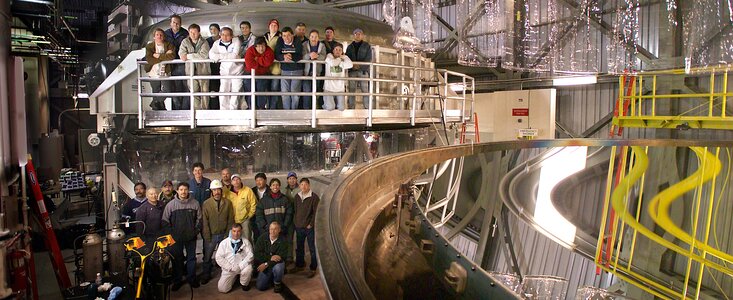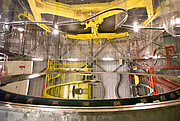Gemini North 8-meter Primary Mirror Successfully Coated with Silver on Mauna Kea
7 December 2004
Gemini staff have successfully repeated the coating of a 8-meter primary mirror with protected silver during a 9-day shutdown period. This is the second successful silver coating of a Gemini primary mirror and was applied on Thanksgiving Day in a 7-hour process interrupted by an intense hail storm at midday.
This is the second time a Gemini primary mirror has been coated with protected silver (Gemini South was coated in May 2004) and now all key optical surfaces (primary, secondary and science fold mirrors) are coated. This is a milestone in front surface mirror coating technology. The result is a dramatic reduction in the thermal emissivity of the telescope systems—down to an unprecedented level of about 2% or lower.
Following the successful coating, team members cheered as reflectivity values were announced and they realized that the coating was successful. The application of protected silver coatings on both Gemini telescopes is the result of a long engineering development project that has involved a large team of individuals who all deserve recognition for this successful outcome. Several team-members commented on the overall flawless cosmetics of the surface that was achieved under especially difficult conditions due to Mauna Kea’s thin air. At nearly 14,000 feet (4,205 meters) Mauna Kea’s air has about 40% less oxygen available for respiration.
Identical protected silver coatings were applied to samples nearly 20 months ago and have not show any sign of corrosion yet. Similarly, the coating applied to the Gemini South primary mirror in May continues to perform well. For technical information on the process used, please view "Coating Gemini's Mirrors With Protected Silver", a PDF excerpt from the December Gemini Observatory Newsletter.
Tests of the coating have shown that its reflectivity and infrared emissivity are exceptional and similar to values obtained at Gemini South earlier this year. These results lead the team to conclude that the coatings on the telescope mirror surfaces will be equally durable. The following data are from measurements obtained following the mirror coating (average standard deviation is 0.29% for 470-880nm and 0.87% at 2.2um):
| Wavelength | Reflectivity |
| 470nm | 93.3% |
| 530nm | 95.0% |
| 650nm | 94.7% |
| 880nm | 96.4% |
| 2.2um | 98.1% |
For the secondary and science fold mirrors coated on the 28th of November, the results are even slightly better:
| Wavelength | Reflectivity |
| 470nm | 93.4% |
| 530nm | 95.1% |
| 650nm | 95.3% |
| 880nm | 96.1% |
| 2.2um | 98.9% |



